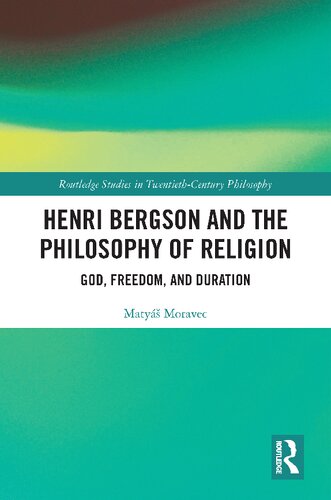

Most ebook files are in PDF format, so you can easily read them using various software such as Foxit Reader or directly on the Google Chrome browser.
Some ebook files are released by publishers in other formats such as .awz, .mobi, .epub, .fb2, etc. You may need to install specific software to read these formats on mobile/PC, such as Calibre.
Please read the tutorial at this link: https://ebookbell.com/faq
We offer FREE conversion to the popular formats you request; however, this may take some time. Therefore, right after payment, please email us, and we will try to provide the service as quickly as possible.
For some exceptional file formats or broken links (if any), please refrain from opening any disputes. Instead, email us first, and we will try to assist within a maximum of 6 hours.
EbookBell Team

0.0
0 reviewsThis book connects the philosophy of Henri Bergson to contemporary debates in metaphysics and analytic philosophy of religion. More specifically, the book demonstrates how Bergson’s philosophy of time can respond to the problem of foreknowledge and free will.
The question of how humans can be free if God knows everything has been a perennial issue of debate in analytic philosophy of religion. The solution to this problem relies heavily on what one thinks about time. The problem of time is central to Bergson’s philosophical system. In this book, the author offers a systematic application of Bergson’s thought to the freedom and foreknowledge problem. The first chapter presents a discussion of Bergson’s central concept of la durée (duration). The subsequent two chapters link la durée to the relation of time and space. Here the author provides a Bergsonian response to McTaggart’s argument for the unreality of time and develops a novel theory of time connected to Bergson’s analysis of temporal experience. The last three chapters explore the relation between free will, determinism, and divine foreknowledge. The author reconstructs Bergson’s theory of freedom and shows how it undermines the underlying dogmas of contemporary free-will theories. The author then argues that Bergson’s philosophy can be used to resolve the free will and foreknowledge problem in the philosophy of religion. The monograph concludes by opening avenues for new research into Bergson and analytic philosophy of religion, such as the philosophy of religious language, the relation between God and modality, religious experience, and religious pluralism.
Henri Bergson and the Philosophy of Religion will be of interest to scholars and advanced students working on Bergson, 20th-century continental philosophy, philosophy of religion, and philosophy of time.